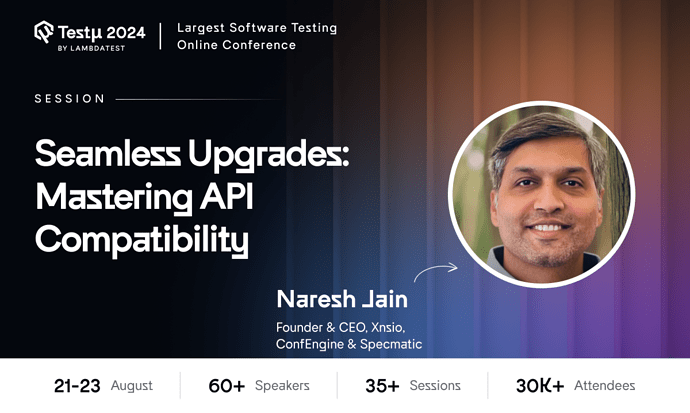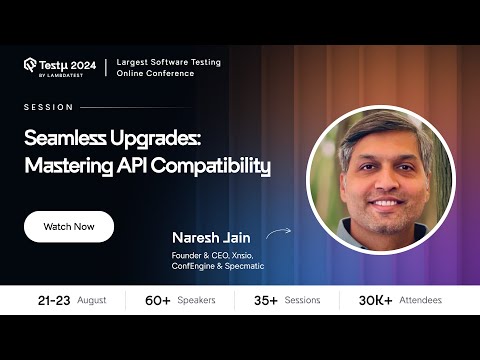Master API compatibility with Naresh Jain and ensure seamless upgrade with API Compatibility. 
As the Founder & CEO of Xnsio, ConfEngine & Specmatic, Naresh brings unparalleled insights to the table! 
 Register now and join the live session.
Register now and join the live session.
Got questions? Drop them in the thread below! Let’s dive deep into API mastery together. 
Hi there,
If you couldn’t catch the session live, don’t worry! You can watch the recording here:
Now, let’s look into some of the unanswered questions.
Can you provide examples of successful strategies for maintaining backward compatibility in APIs?
How can versioning be effectively managed to minimize disruption?
What APIs are most prone to breakage in terms of upgrades and compatibility, and are any extra steps needed to address those kinds of special cases?
What are the best practices for ensuring backward compatibility when upgrading APIs, especially in rapidly evolving environments?
When is it justifiable to deprecate an API version and what strategies can be employed to minimize disruption?
From a QA perspective, what are the key skills or knowledge areas that testers need to effectively use Specmatic for backward compatibility testing?
What strategies would you recommend for integrating Specmatic’s automated compatibility checks into existing CI/CD pipelines without causing significant disruption to current workflows?
In your opinion, how important is it for QA testers to be involved early in the API development lifecycle, and how does Specmatic facilitate this involvement?
Can you explain a bit more about contract-driven approach to ensuring API stability. Also, what are some examples where we can use this in real-life projects?
How can you handle deprecating older API versions without disrupting current users?
How to handle the schema changes efficiently ?
How does SpecMatic handle discrepancies between the contract and the actual API implementation? What mechanisms are in place for diagnosing and addressing these issues?
How specmatic can ease down contract testing?
As a tester, how does Specmatic help us ensure API changes don’t break existing integrations, and how does it simplify the process compared to traditional methods?
How do you ensure cultural and process compatibility when maintaining backward compatibility?
What strategies can be employed to ensure API upgrades do not disrupt existing integrations or client applications?
What are some of the best practices for scaling API testing strategies across larger projects and teams?
How does SpecMatic handle complex scenarios, such as APIs with dynamic or conditional responses? What techniques are used to accurately model and test such scenarios?
![]()
![]()
![]() Register now and join the live session.
Register now and join the live session.![]()

